Hollywood Secrets
Pure Epsom Salt Magnesium Sulfate Pharma Grade 500 gm
Pure Epsom Salt Magnesium Sulfate Pharma Grade 500 gm
Couldn't load pickup availability
Epsom Salt Uses:
Relaxing Baths: Epsom salt is often added to warm baths to help relax muscles, soothe soreness, and relieve stress. The magnesium in Epsom salt can be absorbed through the skin, potentially aiding in muscle relaxation.
Foot Soaks: Soaking your feet in an Epsom salt solution can alleviate foot pain, reduce swelling, and help treat conditions like athlete's foot or ingrown toenails.
Muscle Pain Relief: Epsom salt compresses or soaks can be used to relieve muscle aches, tension, and sports-related injuries.
Skin Exfoliation: Epsom salt can be mixed with your favorite body wash or oil to create a natural exfoliating scrub, helping to remove dead skin cells and promote smoother skin.
Constipation Relief: When taken orally under the guidance of a healthcare professional, Epsom salt can serve as a saline laxative to relieve occasional constipation. It should be used with caution and only as directed.
Plant Fertilizer: Epsom salt is used in gardening to provide magnesium and sulfur, two essential nutrients for plant growth. It can be dissolved in water and applied to the soil or foliage of plants.
Household Cleaning: Epsom salt can be used as an abrasive cleaner to scrub surfaces like bathroom tiles and sinks. It can help remove stains and grime.
Insect Bites and Splinter Removal: Epsom salt can be mixed with water to create a paste that may help reduce itching and inflammation from insect bites and facilitate the removal of splinters.
Hair Volume and Shine: Some people use Epsom salt as a hair treatment to add volume and shine. It's mixed with conditioner and applied to the hair for a short time before rinsing.
Relief from Sunburn: An Epsom salt solution can be applied topically to sunburned skin to help alleviate pain and reduce inflammation.
Homemade Bath Bombs: Epsom salt is a common ingredient in homemade bath bombs and bath salts, which are popular for their relaxing and aromatic properties.
Facial Cleanser: In some skincare routines, Epsom salt is used as a gentle facial cleanser to remove impurities and exfoliate the skin.
Tile Grout Cleaner: Epsom salt mixed with dish soap can be used as a natural grout cleaner, effectively breaking down grime and mold.
Fire Retardant: Epsom salt can be used as a fire retardant in certain applications, such as in the production of fireworks and theatrical props.
Epsom salt benefits
Muscle Relaxation: Epsom salt is often used in baths to help relax muscles. The magnesium in Epsom salt can be absorbed through the skin, and this absorption may aid in muscle relaxation, reduce muscle cramps, and alleviate muscle soreness.
Stress Reduction: Taking an Epsom salt bath can provide a calming and stress-relieving experience. The warm water, soothing properties, and potential relaxation of muscles can contribute to overall stress reduction.
Pain Relief: Epsom salt soaks or compresses may help alleviate various types of pain, including joint pain, arthritis discomfort, and general aches and pains.
Improved Sleep: Some individuals find that Epsom salt baths taken before bedtime promote better sleep quality by relaxing the body and mind.
Digestive Health: When used orally under medical supervision, Epsom salt can serve as a saline laxative to relieve occasional constipation. It works by increasing water in the intestines and promoting bowel movements. However, this should only be done as directed by a healthcare professional.
Detoxification: Advocates claim that Epsom salt baths can aid in detoxification by promoting the elimination of toxins through the skin. However, scientific evidence supporting this claim is limited.
Skin Health: Epsom salt may help exfoliate the skin and cleanse pores when used in skincare routines. It can be used as a gentle facial or body scrub.
Reduction of Inflammation: Some individuals use Epsom salt to reduce inflammation associated with conditions like gout or minor skin irritations.
Nerve Function: Magnesium is essential for nerve function, and Epsom salt baths may help support healthy nerve function in the body.
Improved Circulation: Soaking in an Epsom salt bath may promote better blood circulation, potentially benefiting overall cardiovascular health.



Why Us
Why Us
- Customization: Our DIY cosmetic brand empowers you to personalize your beauty products according to your preferences.
- Quality Control: By choosing a DIY cosmetic brand, you have complete control over the quality of the ingredients used in your beauty products.
- Creativity and Expression: Our DIY cosmetic brand encourages your creativity and allows you to express your unique style.
- Sustainable and Eco-friendly: Many mass-produced cosmetic brands generate significant amounts of waste and contribute to environmental pollution. By choosing a DIY cosmetic brand, you can actively reduce your ecological footprint.
- Education and Empowerment: Our DIY cosmetic brand aims to educate and empower individuals about the ingredients, formulation techniques, and the science behind cosmetic products.
- Cost-effective: Creating your own cosmetics can be a cost-effective alternative to buying high-end branded products.
Features of the product
Features of the product
- Premium product.
- 100% original & quality assured.
- Non-contaminated & non-mixed.
- Non-Gmo.
- Doctor & dermatologist approved.
- No preservatives.
- Easy to use.
Payment Method
Payment Method
Payment India:
Credit card: Available
Debit card: Available
Razorpay (Cards, UPI, Net Banking, Wallets): Available
Cash on Delivery (COD): Available
We accept all forms of payment.
Payment United States:
Credit card: Available
Shipping
Shipping
Prepaid & COD order: Both available.
Standard Shipping: 1-7 days (Free)
Expediated: 1-3 days ( Rs. 90)
Ultra high speed delivery using our selected couriers.
Processing Time
Processing Time
Product ordered before 11am: Shipped on the same day
Product ordered after 11am: Shipped on the next day
Return Policy
Return Policy
1-7 days. Call our customer care for returns.
Contact us
Contact us
WhatsApp & Call : +91-9921645094
Email: info@hollywoodsecrets.in
Share
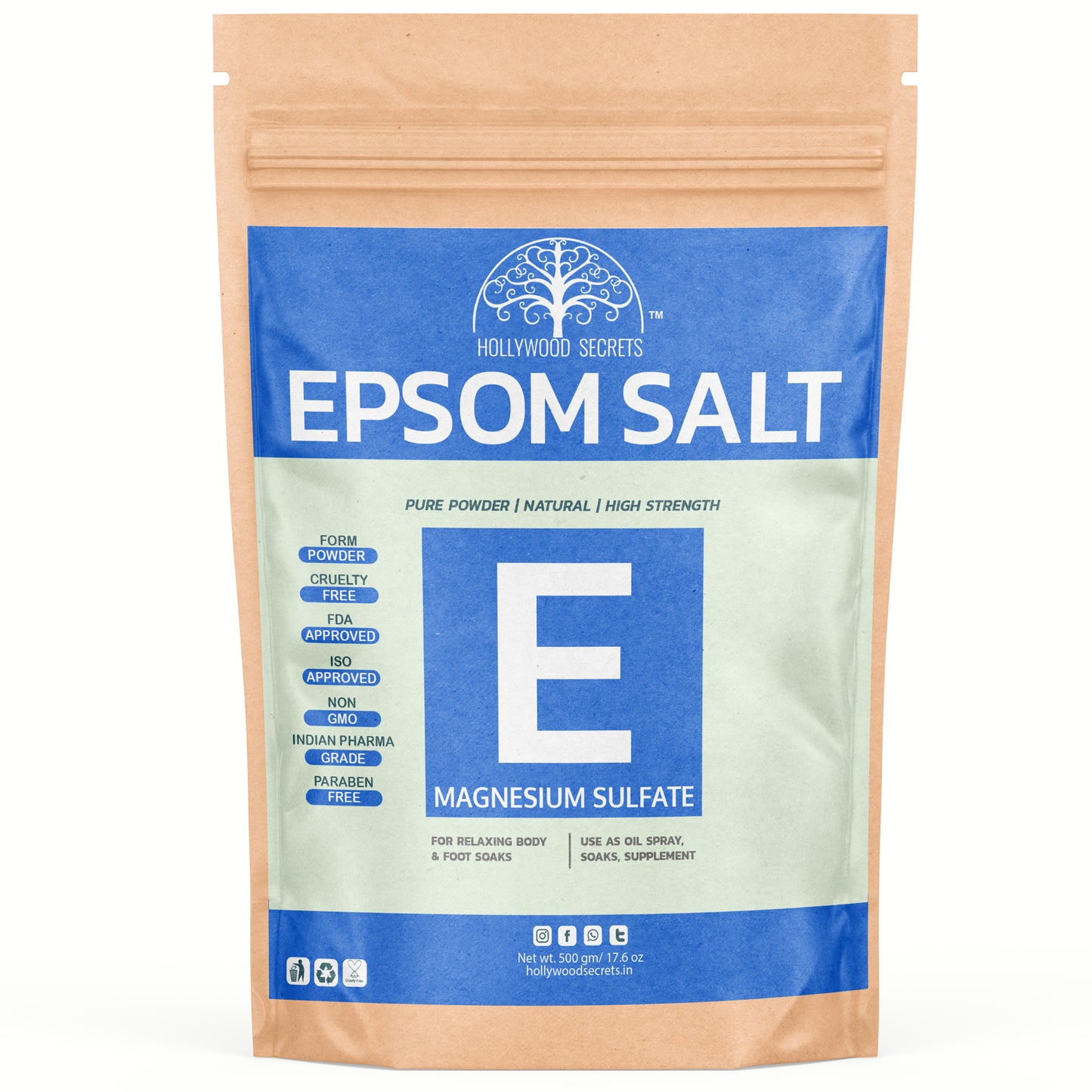
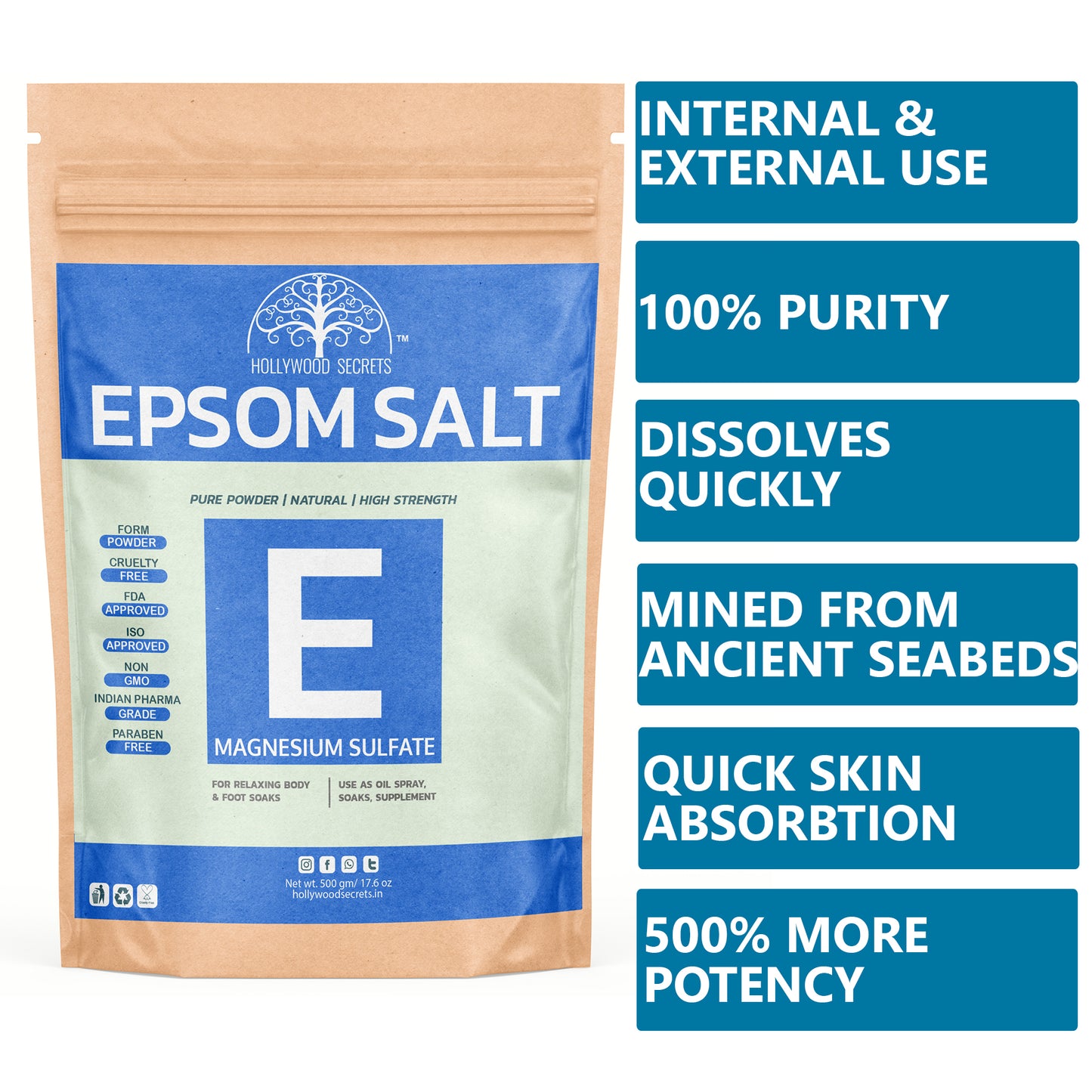
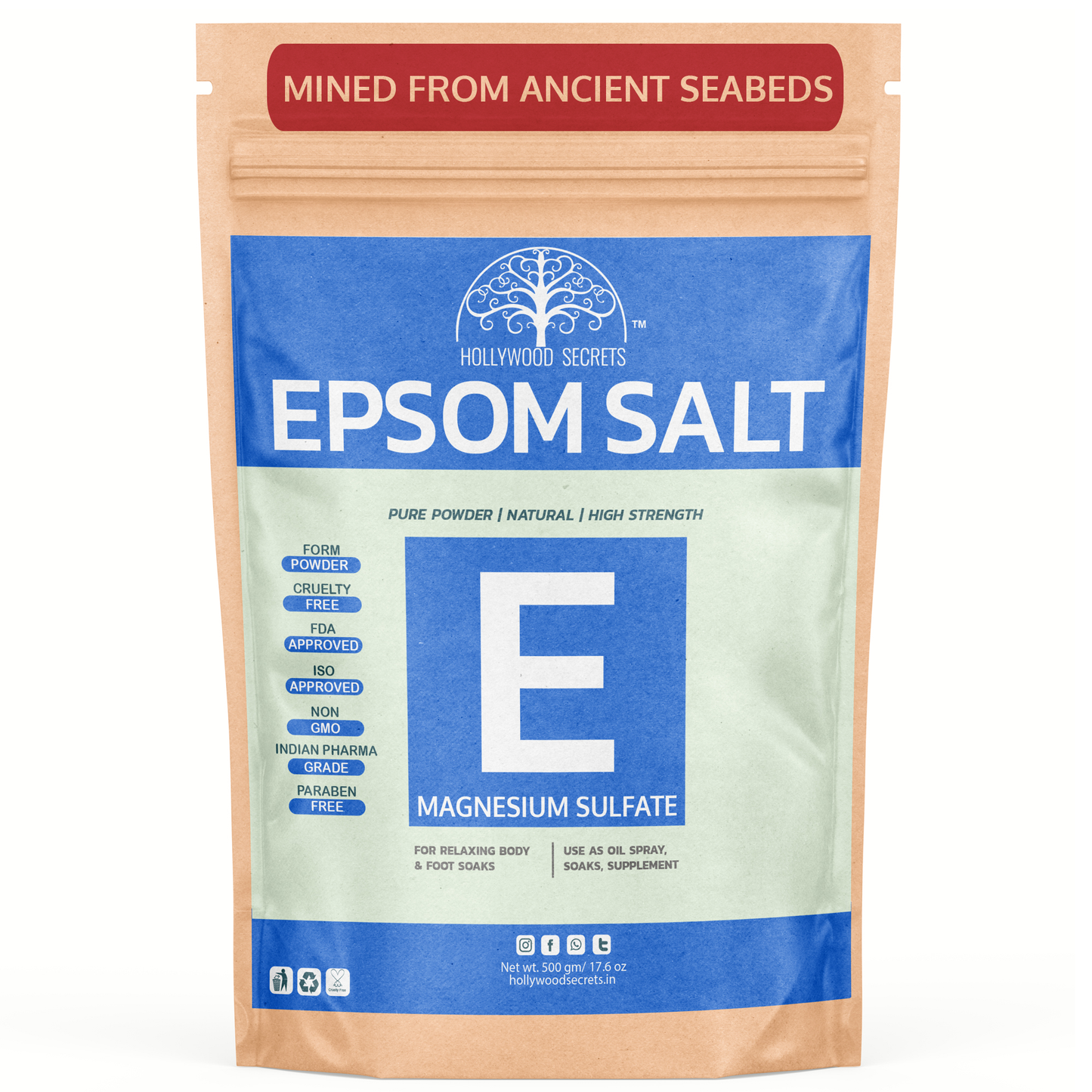
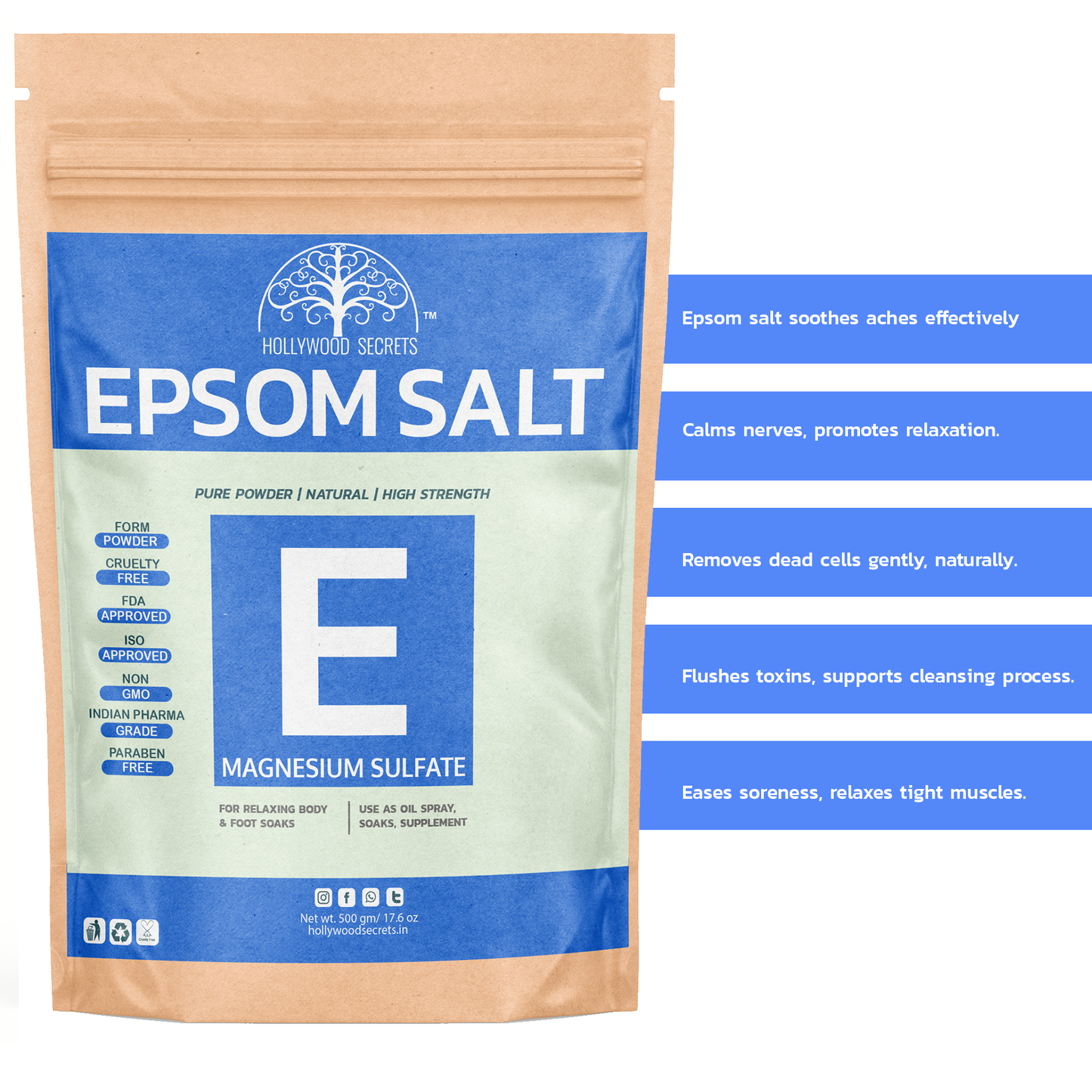
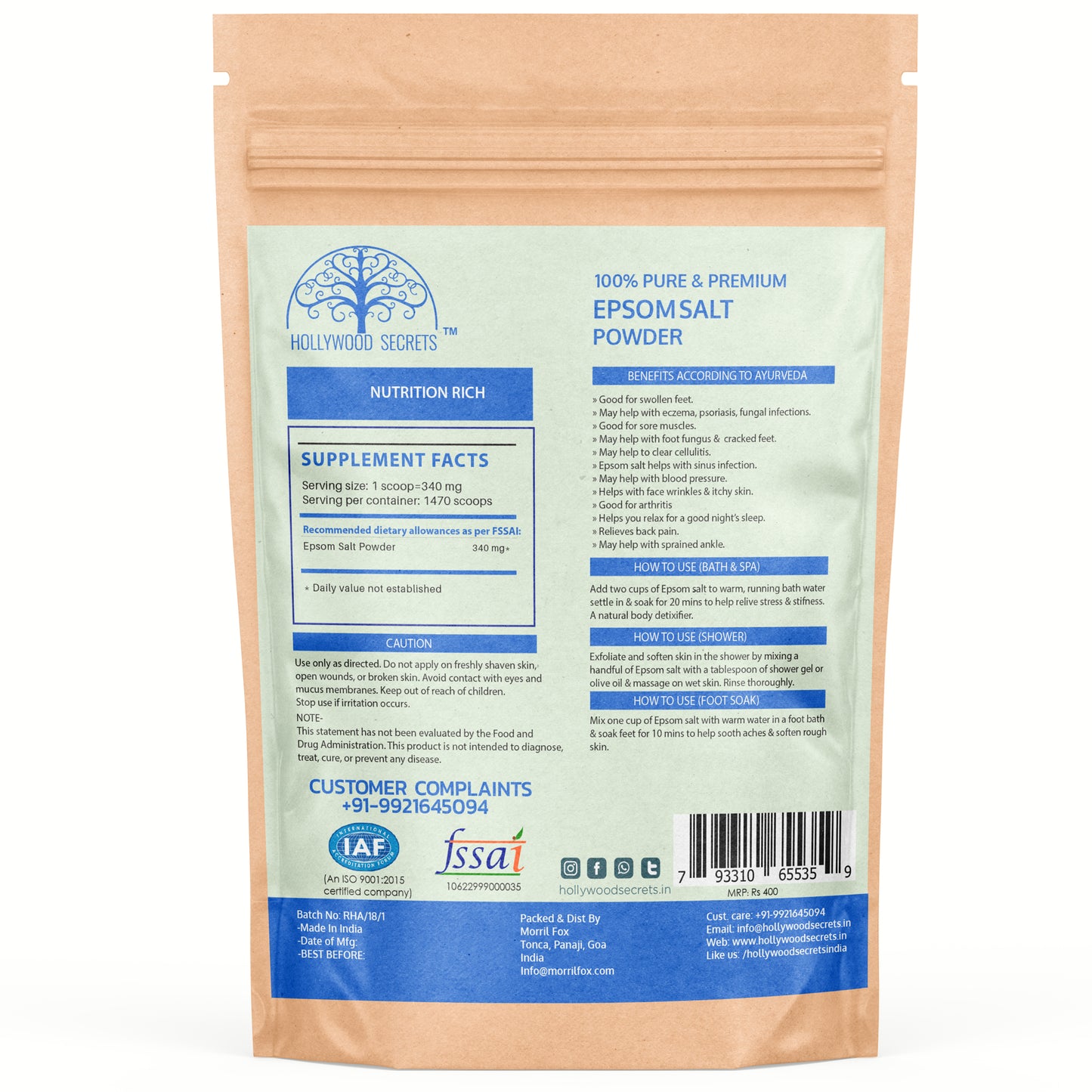

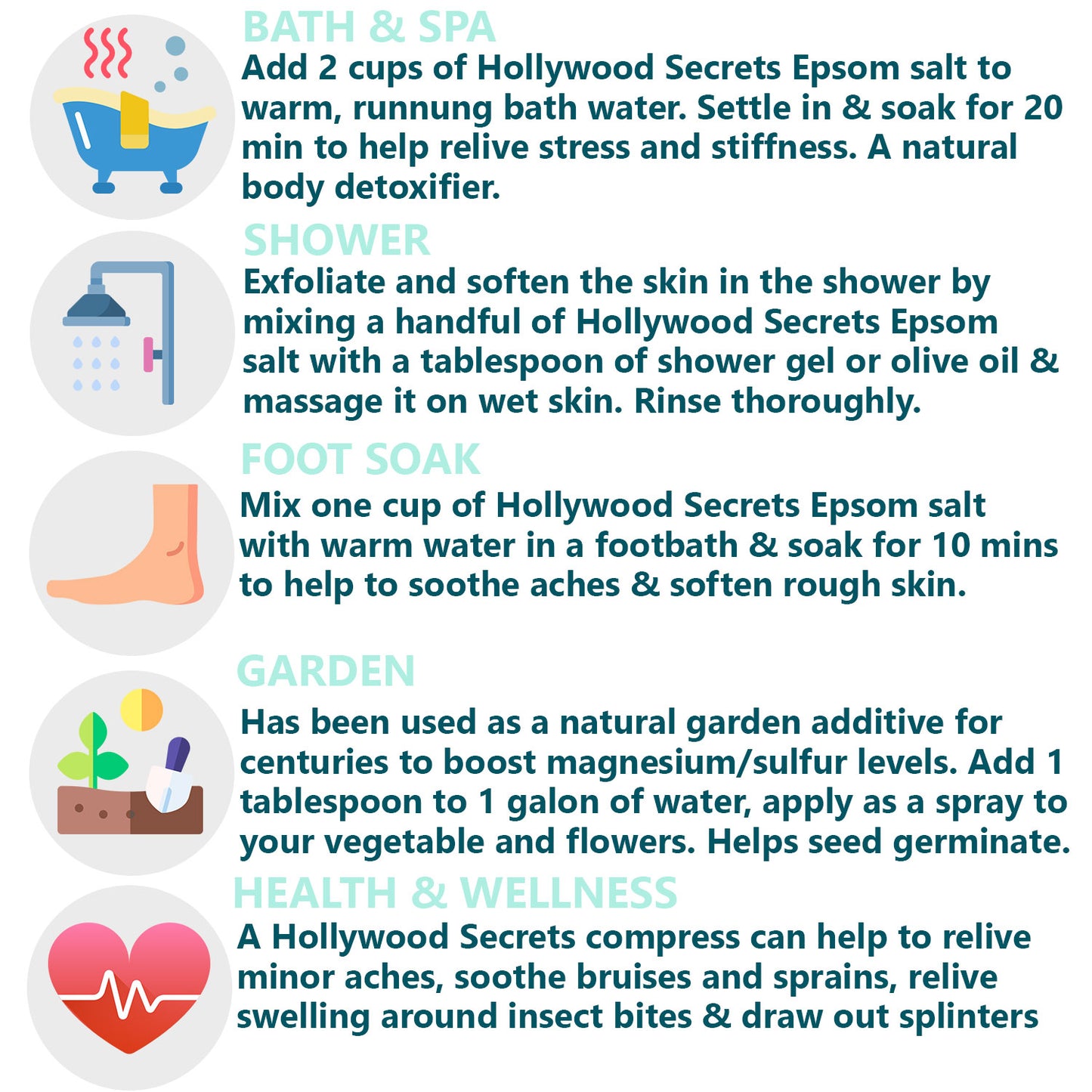
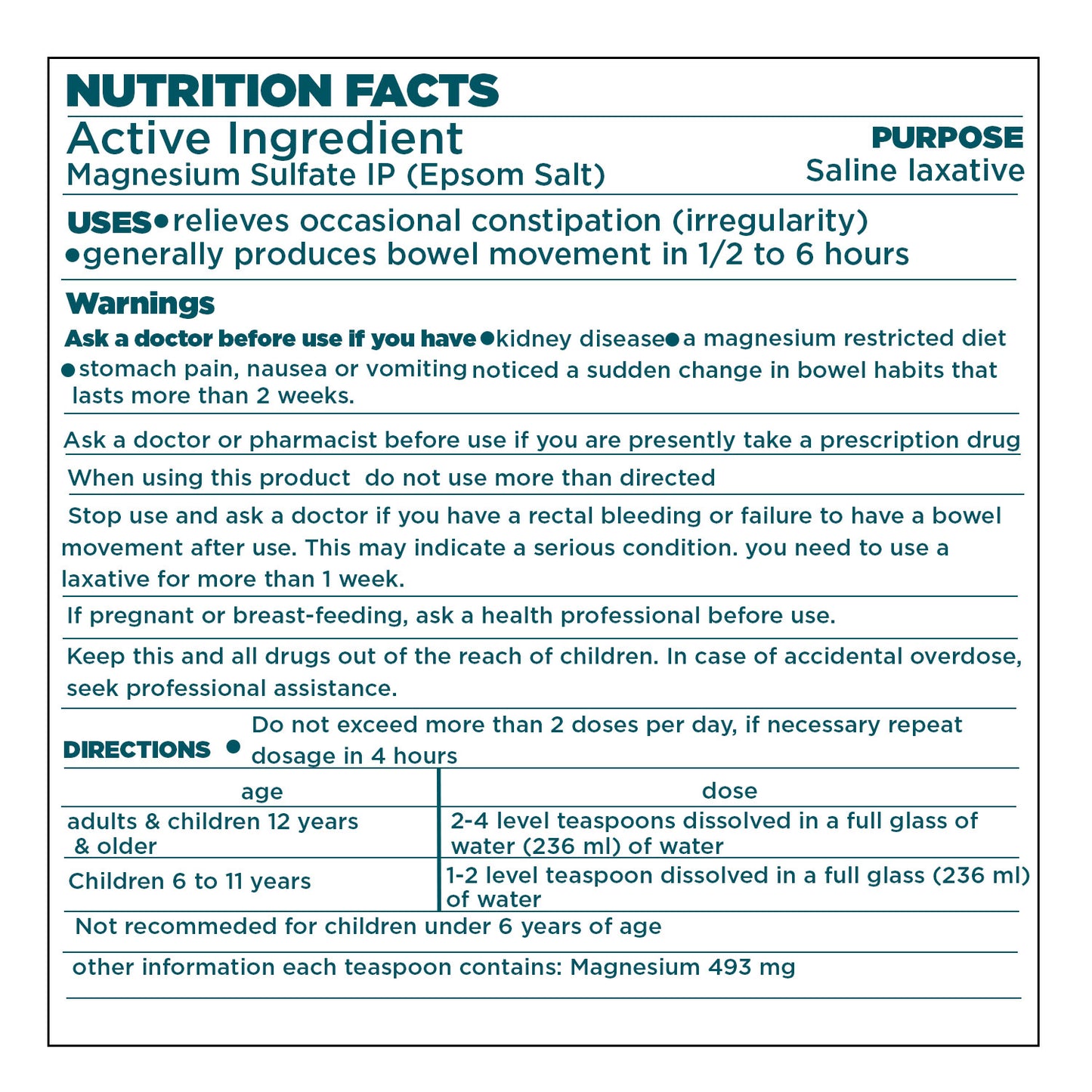
Hollywood Secrets
PRODUCT DETAILS
Product Details
Calculations
How to use (Formulation Guide)
HOW TO USE FOR PLANTS:
-Determine the Need: Before applying Epsom salt, it's essential to determine if your plants actually require magnesium or sulfur. Signs of magnesium deficiency include yellowing leaves with green veins, while sulfur deficiency can lead to poor plant growth.
-Choose the Right Time: The best time to apply Epsom salt to your plants is during the growing season. Spring and early summer are ideal, as this is when most plants are actively growing and can benefit from the nutrients.
-Dissolve Epsom Salt: Epsom salt should be dissolved in water to create a solution that can be easily applied to the plants. To make the solution, mix 1-2 tablespoons of Epsom salt per gallon (3.78 liters) of water. Stir well until the Epsom salt is completely dissolved.
-Apply to Soil: Water the base of your plants with the Epsom salt solution. Avoid splashing the solution onto the leaves, as this can lead to leaf burn. Use the solution as a regular watering method every 4-6 weeks, depending on the specific needs of your plants.
-Foliar Spray (Optional): For a quick magnesium boost, you can also apply Epsom salt as a foliar spray. Dilute 1-2 tablespoons of Epsom salt in a gallon (3.78 liters) of water and spray it directly onto the plant leaves. Do this early in the morning or late in the evening to prevent leaf scorch from the sun.
-Monitor Plant Response: Keep an eye on your plants' response to the Epsom salt application. If you notice improvements in leaf color, growth, and overall health, continue the application as needed. However, avoid overuse, as excessive magnesium can interfere with the uptake of other nutrients.
-Use in Specific Cases: Epsom salt is particularly beneficial for magnesium-loving plants like tomatoes, peppers, and roses. It may not be necessary for plants that do not exhibit signs of magnesium or sulfur deficiency.
-Adjust Dosage: The amount of Epsom salt you use may vary depending on the size of your garden and the specific plants you are growing. Be sure to adjust the dosage accordingly, and it's always a good practice to start with a slightly lower amount and observe the plants' response.
HOW TO USE EPSOM SALT FOR BATH
-Gather Your Supplies:
Epsom salt
Bathtub
Warm water
A towel and comfortable clothing for after your bath (optional)
-Measure the Epsom Salt:
For a standard-sized bathtub, use 1 to 2 cups of Epsom salt. However, the amount can vary depending on personal preference and the purpose of the bath. You can start with 1 cup and adjust it in subsequent baths if needed.
-Fill the Bathtub:
Run warm water into the bathtub. The water should be at a temperature that is comfortable for you but not too hot, as boiling water can be dehydrating for the skin.
-Dissolve the Epsom Salt:
As the bathtub is filling, add the measured Epsom salt to the running water. Stir the water with your hand to help the Epsom salt dissolve fully. It may take a few minutes to dissolve completely.
-Soak and Relax:
Once the Epsom salt is dissolved and the bathtub is filled to your desired level, step into the bath. Soak in the Epsom salt bath for at least 15-20 minutes, or longer if you prefer. You can bring a book, play relaxing music, or simply close your eyes and unwind.
-Rinse Off (Optional):
After your Epsom salt bath, you can choose to rinse off with clean water to remove any residual salt. Some people prefer to leave the salt on their skin for added benefits.








